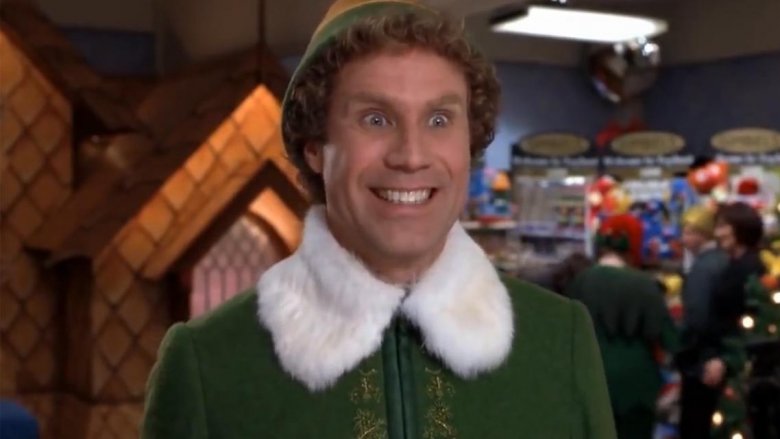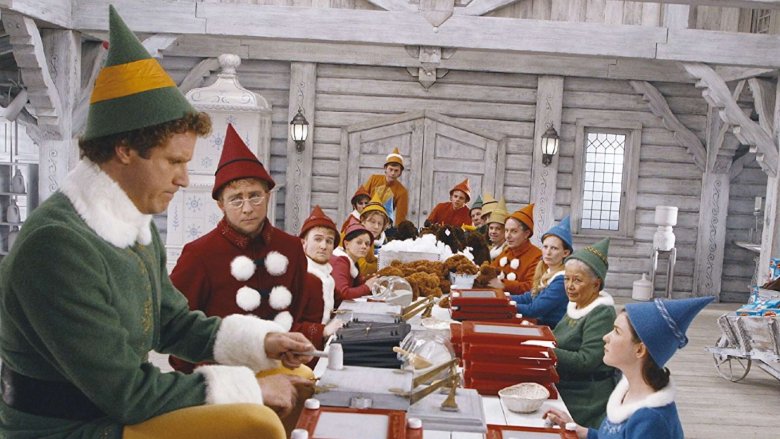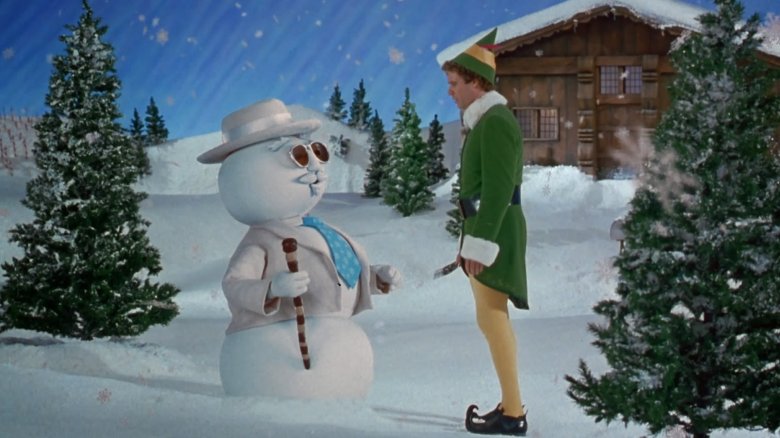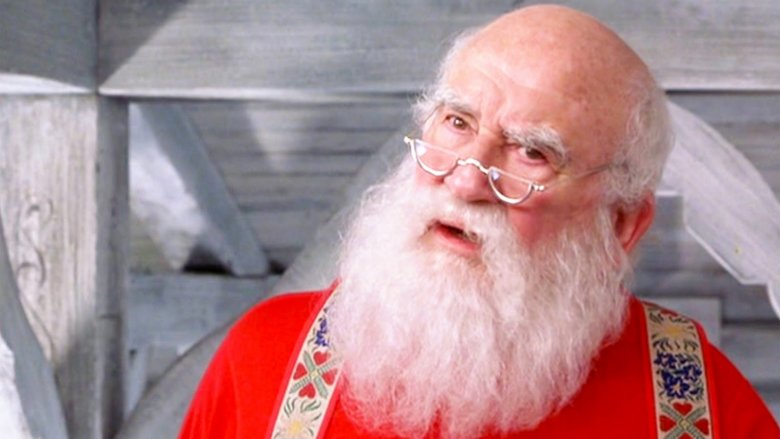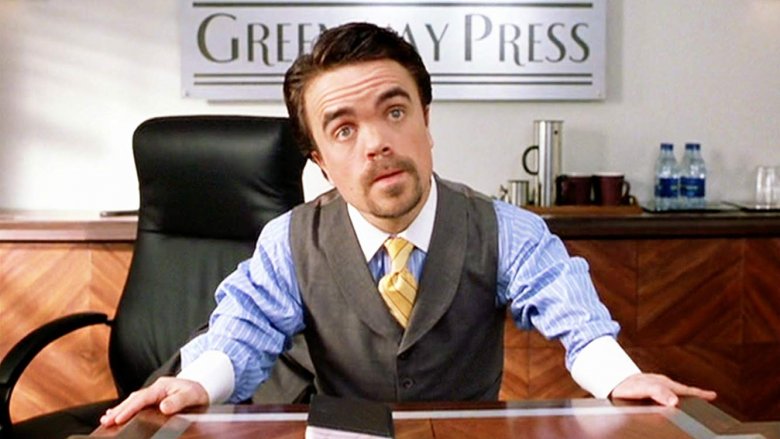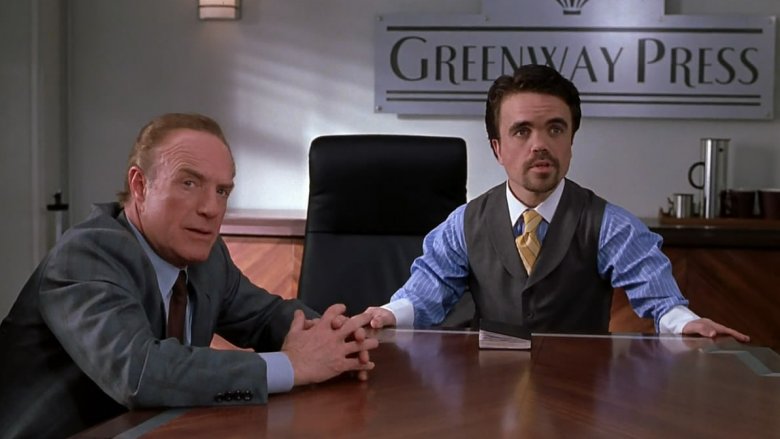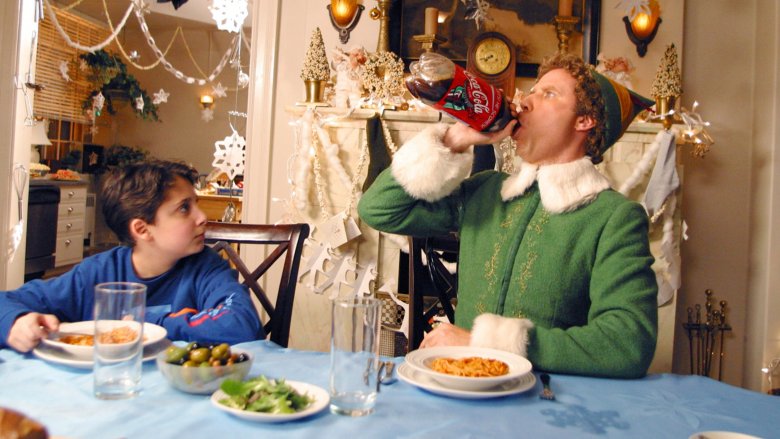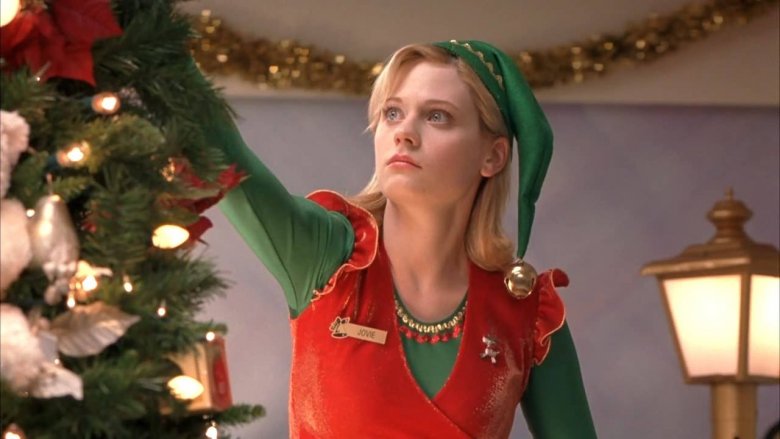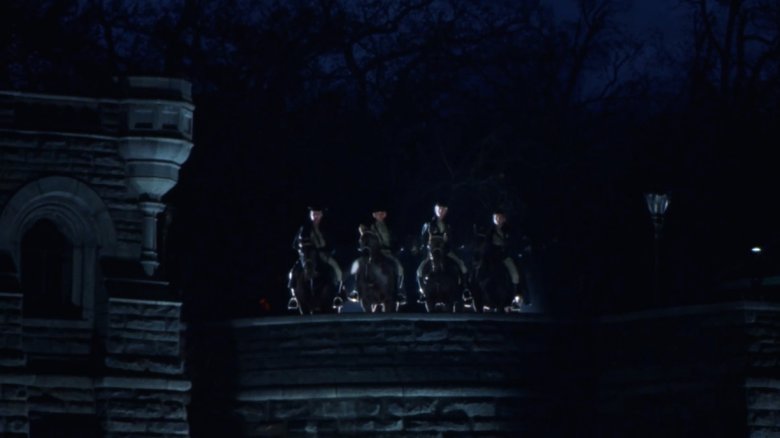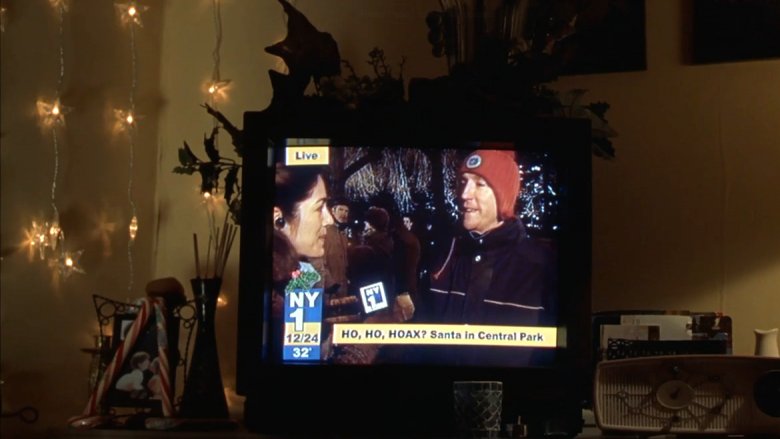Things Only Adults Notice In Elf
Elf, the Will Ferrell comedy about a human raised by elves who returns to our world to meet his family, has firmly found its place in the canon of holiday classics that families simply must sit down and watch together every Christmas season. Fans of all ages have fallen in love with the story of Buddy the Elf (Ferrell), his sincere love of Christmas, and his unshakable desire to spread cheer by singing loud for all to hear.
The film's appeal across a very broad age range means that everyone sees Elf just a little differently. For kids, it's the story of a funny elf man trying to find his way in the real world and, ultimately, saving Christmas. Adults can appreciate that too, but they might also see so much more. From the strange nature of the North Pole's wildlife to Buddy's relationship with the adult world, here are ten things only adults will notice in Elf.
Buddy and nudity
Elf operates in many ways as a classic fish out of water comedy, with Buddy learning how things work in the human world after spending nearly all of his life living with elves. This creates wonderful moments (like Buddy using an escalator for the first time), but also a little bit of audience confusion, because sometimes the worlds of elves and humans aren't all that different. This is particularly true when nudity is involved.
When Jovie (Zooey Deschanel) reprimands Buddy for singing along with her while she's in the shower, he claims he didn't know she was naked, but the North Pole scenes show that Buddy has used a shower before. He also reacts to Walter's (James Caan) command to "lose the tights" by stripping down in the Hobbs family kitchen, something he probably wouldn't have done at the North Pole. Is Buddy simply too rattled by his new surroundings to remember how privacy works, or are the fan theories that he's secretly a bit of a creep a little too accurate?
Buddy and technology
The North Pole of Elf is, in many ways, modeled after the simple, rustic versions depicted in early Rankin-Bass Christmas specials like Rudolph the Red-Nosed Reindeer, so the elves lead a relatively simple life. This means that when Buddy makes it to the technology-heavy world of humans, he's a little overwhelmed... but how overwhelmed should he actually be? During the school scene in which Buddy recites the "Code of the Elves," his teacher mentions that they're about to learn how to build graphics chips, and Papa Elf has enough technical knowledge to build what is essentially a jet engine for Santa's sleigh.
When Buddy arrives in the human world, though, he marvels at the sound of a radiator in the Hobbs apartment, and is surprised by how the telephone works. Later in the film, he apologizes for cramming "11 cookies into the VCR." Is the North Pole just really specific in regards to what kind of technology the elves get to see? Has Buddy simply never dealt with technology this closely? Whatever the explanation is, basic gadgets like telephones seem strangely magical to him.
North Pole wildlife
Elf's relationship to classic Christmas specials also brings a few key supporting characters, namely talking animals and a folksy snowman named Leon, obviously modeled after stop-motion Rudolph characters. They're great additions, and their brief scenes are fun, but their presence in a film that spends so much time in the "real" world raises a couple of interesting questions, particularly after Buddy approaches a raccoon out in the forest expecting it to be just as friendly as his pals up north.
These talking creatures seem to be exclusive residents of the North Pole, but why is that? Is there a kind of magic there that allows them to flourish? That would make sense, seeing that it's where Santa lives, but how far does that extend? Can the creatures migrate at all? Leon mentions traveling the world as a cloud when he was younger, so we know he has memories of existing before he was a snowman. Was he able to communicate then? Was he always made of magical precipitation, or did Santa grant him sentience?
Buddy travels through a candy cane forest and sea of gumdrops to get to New York, so is there a magical barrier between the North Pole and our world? Can the friendly narwhal swim around all of that? It seems unlikely, but it's also possible that some cryptozoologist somewhere will stumble upon a talking clay puffin one day.
Santa's hobbies
Elf features the great Ed Asner playing one of the best versions of Santa Claus ever on film. He's enthusiastic without being cartoonish, kind without being saccharine, and just plain cool thanks to Asner's portrayal of the character as a man who's done it all and seen it all. This point is really driven home when Santa gives Buddy some advice about New York, including where to find the real "original" Ray's Pizza and what a "peep show" actually is.
This knowledge, plus Santa's overall bearing throughout the film, suggests a man who does much more with his time than preparing for Christmas Eve, delivering presents, and coming back home. Is the real Claus working as a mall Santa and then hanging out at Ray's Pizza between gift deliveries? Has he visited a peep show, even if it was just out of curiosity? Does he know all of this from experience, or just because he spends so much time keeping an eye on humanity?
Who are the South Pole elves?
After mistaking children's book author Miles Finch (Peter Dinklage) for an elf, Buddy is roped into a fight with the "Golden Ghost" that leads to Finch storming off and Walter flying into a rage. After the tussle, Buddy remarks that Finch's behavior means he "must be a South Pole elf." During the film's opening sequence, Papa Elf remarks that elves can aspire to three main careers: Santa's workshop, shoemaking, or baking cookies. He never mentions exactly where elves come from, or what it means to live anywhere other than the North Pole.
Does this mean the South Pole is the place where elves end up if they simply aren't cheerful enough to work for Santa? Do they make shoes and cookies while they're down there? Is it a place where elves are simply exiled? What is elf society like without the presence of Santa Claus? The film never clues us into this, so perhaps "South Pole elf" is just some kind of slang term for an elf that doesn't behave as other elves do. Whatever the case, it apparently means you're bad news to other elves.
The private life of Miles Finch
Speaking of Miles Finch, he's a character who shows up for only a couple of scenes in Elf, but he remains a fascinating figure in the story. Finch is called in when Walter and his staff need to come up with a new hit children's book idea by Christmas Eve, but they're out of original concepts. They bring in Finch, a ghost writer who's clearly had a lot of lucrative success with children's picture books. Finch is paid a hefty cash sum upfront, asks for a Mercedes to pick him up at the airport, and tells Buddy that he has houses in L.A., Paris, and Vail.
He's done very well for himself, not as a world-famous writer like J.K. Rowling, but apparently as a ghost writer in the realm of picture books, a field in which few writers ever have the kind of success that puts them in multiple massive houses. So, who exactly has Finch ghosted for to make him that wealthy? Has he churned out books for the Dr. Seuss estate? Does he simply write so many books for so many publishers that he's able to maintain this lifestyle? Or is the world of Elf one where picture book authors are regularly making Stephen King money?
Buddy the Elf, medical marvel
Buddy the Elf is not an elf. He's a human raised by elves. The film makes this clear several times, and it's the linchpin of the whole story. What the film also makes very clear, though, is that Buddy's time with the elves has made him a kind of marvel among humans. He seems to have lived for 30 years on a diet of mostly candy, he considers 40 minutes a good night's sleep, and he can decorate department stores and throw snowballs with a speed and skill that can only be described as superhuman.
Now, obviously Buddy's upbringing was very different from that of a typical human, so he's had the opportunity to get used to things other people would simply never think of. If you cut out a paper snowflake enough times, you're bound to get good at it, and the same is true of throwing snowballs. Plus, if you eat enough candy for long enough, your digestive system might just accept that as the new normal. Still, it doesn't entirely add up, and while kids might accept this as part of the North Pole magic of the movie, adults are watching Elf and wondering why Buddy is not a diabetic with severe malnutrition issues.
Buddy's love life
After arriving in New York and finally meeting his human family, Buddy wastes little time in getting romantically involved with Jovie, a department store "elf" to whom he's immediately attracted. Jovie seems to like Buddy because of his sense of joy and innocence, and the way he views the world through fresh, un-jaded eyes. There's also no getting around the obvious pitfall, though, that he's a grown man who only knows how to live like a North Pole elf.
Now, we know from context clues in the film that elves can fall in love and reproduce, so Buddy wasn't exactly shielded from that reality. What we don't know is how courtship, let alone sexuality, works in Santa's world. With all of this in mind, despite their clear affection for each other, Buddy and Jovie probably have to navigate some rather awkward territory in the time between falling in love and having baby Susie together. However weird it was, though, Jovie has clearly adjusted by the end of the film.
The Central Park Rangers vs. Santa Claus
After Santa's sleigh goes down in Central Park on Christmas Eve, there is a surprisingly swift and decisive response from the City of New York. While a crowd gathers outside, the NYPD closes the area, and the Central Park Rangers move in to investigate. As NY1 reporter Charlotte (Claire Lautier) notes, the rangers are elite cops with a questionable history, and they don't seem to be confused about what they're looking for. They head right for Santa, who remarks that they've never forgiven him for putting them on the naughty list.
This suggests a couple of things. First of all, the Central Park Rangers had the park closed just so they could hunt down Santa. Secondly, the rangers did something very bad to get on the naughty list. As for the latter issue, there's a fan theory going around that they actually caused the death of Buddy's mother during that fateful Simon and Garfunkel concert. Their possible issues with Santa are less clear, but it brings to mind a scary thought: what would the rangers have done if they'd actually caught him?
The aftermath of a Santa sighting
Buddy the Elf helps to save Christmas by repairing Santa's sleigh in Central Park, and the film's climax is resolved as Buddy and Santa soar away, over the buildings of Manhattan and off into the night sky to finish the Christmas Eve gift deliveries. It's a beautiful moment, and it's also witnessed by a crowd of people who have gathered outside the park to see what all the fuss is about and, eventually, sing Christmas carols.
Elf was released in 2003, so no one in the crowd is livestreaming the events or posting photos to Twitter, but there are still a good many people who at least glimpsed Santa's sleigh leaving the park that night. Now, all of those people have to go back home and either keep that to themselves or try to explain what they saw. How does that affect the overall sense of Christmas spirit? Santa says it's about "believing, not seeing," so do these stories make more people believe, or do all of those witnesses go home to families who are convinced that they're nuts?
